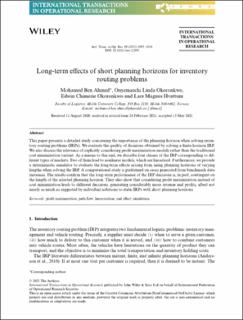Long‐term effects of short planning horizons for inventory routing problems
Peer reviewed, Journal article
Published version

Åpne
Permanent lenke
https://hdl.handle.net/11250/3036811Utgivelsesdato
2022Metadata
Vis full innførselSamlinger
- Artikler [412]
- Publikasjoner fra Cristin [429]
Originalversjon
International Transactions in Operational Research, 2022, 29 (5), 2995-3030 http://dx.doi.org/10.1111/itor.12998Sammendrag
This paper presents a detailed study concerning the importance of the planning horizon when solving inventory routing problems (IRPs). We evaluate the quality of decisions obtained by solving a finite-horizon IRP. We also discuss the relevance of explicitly considering profit maximization models rather than the traditional cost minimization variant. As a means to this end, we describe four classes of the IRP corresponding to different types of markets. Two of them lead to nonlinear models, which are linearized. Furthermore, we provide a deterministic simulator to evaluate the long-term effects arising from using planning horizons of varying lengths when solving the IRP. A computational study is performed on cases generated from benchmark data instances. The results confirm that the long-term performance of the IRP decisions is, in part, contingent on the length of the selected planning horizon. They also show that considering profit maximization instead of cost minimization leads to different decisions, generating considerably more revenue and profits, albeit not nearly as much as suggested by individual solutions to static IRPs with short planning horizons. Keywords: profit maximization, path flow, linearization, end effect, simulation
